Issue Number 48, Spring 2020
Contents
- For What It's Worth by D. James Smith
- Ice Music by Terry Blackhawk
- Triptych by Catherine Jagoe
- April Seventh by Gene Berson
- The Seahorse by Gene Berson
- Litany of the Sow by Margo Taft Stever
- Reading the Leopard by Susan Cohen
- Puerto Don Juan by Rafaella Del Bourgo
- What the Stream Knows by J.I. Kleinberg
- Return to Sender by Marna Owen
- Sea Lion by John Schneider
- Close Encounter in the Wild by Daniel Hudon
- Clearing the Sparrow's House by Kim Schnuelle
- Vanishing by Elizabeth Herron
- Coming Back by Nancy Takacs
- Blue Bird by Louise Gwathmey Weld
- Consequences by Donna J. Long
- Poem on Good Friday by Daniel Boland
- Accidental Garden by Diane Ray
- Waiting by Federica Santini
Archives: by Issue | by Author Name

For What It's Worth
by D. James Smith
Smith lives in the irrigated, semi-arid desert plain of California's central valley, spending a great deal of time in the nearby foothills and the Sierra.

If I could I’d repeat, exactly,
What this bird, close by, whistles
Out of its private reason
I might know it and more
Of this night passing quickly.
Maybe this cricket
At the back of my throat
Wouldn’t scratch and falter.
Summer fires in the mountains
Wreath the valley like a great army encamped,
Stars picking up where those torches leave off.
Much needs burning off.
Little needs my prayer.
Nights like this, wandering
Out of the black thorns
Where my sleep tends to nest,
I see that I was blessed
To have begun early to refuse
The lie that you can’t find a way
To love your life, though everyday
It is required that I say all right
To my small allotments of sorrow.
Yes, I say, Lay your life down;
Right where you are will do fine.
Think with the urgency of forests on fire,
And a bird that listens
With intelligent silence
Before singing out.
And now, even this
Cricket beginning,
Strumming the little
Guitar of itself.
© D. James Smith
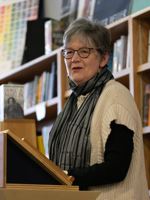
Ice Music
by Terry Blackhawk
Now a resident of Connecticut, for many years Terry lived and wrote not far from the Detroit River (in fact a strait--Detroit in French--connecting Lake Huron and Lake Erie) and its beautiful refuge on the city’s Belle Isle. The area is home to the Detroit River International Wildlife Refuge and is at the intersection of the Atlantic and Mississippi migratory flyways.

ice melt ice lace ice
breaking up upstream
coming down from up
north in variegated
quilts of floes
no
instant’s act
this
crumbling
an entire
season sends broken
continents our way
once-miles-wide chunks break
and bob or push up
against the shore
in spun sugar turrets
they rise fall glistening
dissolving ice lace
ice music I seem
to hear a tremolo
in the trees
but it’s March no leaves
no breeze just the score
for the scene
before me silvery
glissandos rising
from a streaming swarm
of glinting
creatures herded
by the current
in a living touching
clinking singing surge
© Terry Blackhawk

Triptych
by Catherine Jagoe
Catherine lives in the Yahara watershed, at the point where the last glacier stopped, in an area the Ho-Chunk named Dejope, meaning “four lakes.”
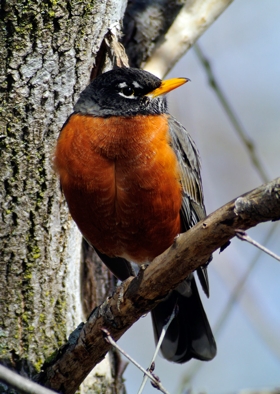
1.
Into our bedroom’s dark funk, before dawn,
For the first time in months, drift fragments of song.
A robin—just back—on the garage roof
Threads this northern silence with notes.
Freezing drizzle, gray pall, the lawn piebald with snow—
But he’s giving thanks. His three limpid phrases
Of praise rise & fall, piercing my caul of sleep.
He’s the bridegroom of half-light, of dream.
Wished-for as clean water, the bright drops of his song
Stitch winter to spring. We’re no longer alone—
His voice marries us, and this is his psalm:
To live is to give voice. All days are one.
2.
This is the time of shape shifters. The skyline morphs
From peach to indigo. Raccoons materialize from drains.
Commuters climb into their carcoons, corpuscles in the city’s veins.
Houses exhale & stretch. Porch lights snap on.
The great blue heron flaps back to her roost. The barred owl
In the white pine blinks his yellow eyes, feels hunger stir.
A siren shrieks & from the shades, unseen coyotes keen:
A high, wild chorus to misfortune.
This is the time when, from the greenworld, deer appear,
As if formed out of smoke, in twos & threes,
To crop the grass with delicate precision. Shades of the ancestors
Drift closer, haunting the perimeters of home.
3.
There is so much to fear in the country of darkness.
You’ll think you’re sinking, you could founder in its waters,
That you’ll vanish like a bright coin tossed in a well,
That you’ll never swim back up or be recovered.
Know this: that one day you’ll be found
Up on the moors at midsummer, with curlews bubbling,
Cupped in rainwater in the hollow of an ancient stone.
A boy will find & burnish you & keep you in his pocket.
The moon’s bone ball swivels slowly in the socket of sky.
Night’s a corrective, a necessary physic.
Only at night can you glimpse the history of distant stars.
Only at night can you see how small, & how accompanied, you are.
© Catherine Jagoe

April Seventh
by Gene Berson
Gene lives in the northern California foothills in the Yuba River watershed. Everyone goes to the river. Like a temple, with its falls its rapids its green pools, it seems to restore everyone in a personal way. We feel our kinship through it.

The sun is making the camellia leaves
sparkle and I’ve got a decent cup of coffee at my elbow
as I type along in bed. I will get up to do
whatever I want to do; I am healthy;
my financial anxieties are in abeyance.
That the world is turning on a spear
through its beautiful heart, that blue jays
tune their shrieks by sharpening their beaks
on a whetstone of human bone
indicates the wider world is continuing
its common suffering under a calm sky. I suffer the silent
opening of the white camellia in private bliss.
© Gene Berson

The Seahorse
by Gene Berson
Gene lives in the northern California foothills in the Yuba River watershed. Everyone goes to the river. Like a temple, with its falls its rapids its green pools, it seems to restore everyone in a personal way. We feel our kinship through it.

While nuclear submarines nose between angles
of shadowy green below the South China Sea
where a new variety of seahorse was recently discovered,
the stately seahorse coils its tail around seaweed,
a negligently familiar gesture, and hovers
in a world where everything sways.
Steadied by that intimate touch,
the rocking seahorse stays in place
its hummingbird fins a blur.
What does it know
hidden in the orchestral sway of kelp
in its miniature G-clef body?
We answer its mystery with a category.
No seahorse knows it shows up in a book
as a fish. And it doesn’t know the strategic
geopolitical value of the South China Sea.
Its coherent eye is so meticulously
camouflaged within warping shadows
we cannot see it as it sees a world
through its own disguise.
The seahorse is serenely alert
in its palace of kelp. Everything is perfect.
Can we ever contemplate anything
without believing it reflects mankind?
Thus my mantra for sanity is this:
The seahorse is calm
below the leaping ocean where wind
tears loose the hem of the waters
continually unraveling them,
a magic carpet woven with spit,
coming apart in space
and coming together again so no one can tell.
Little flying horse of the sea,
guide me bravely through the trash
with your wide-open eye. Lift me
on the music your tiny wings create
without going anywhere.
My wish is to see as you see
touch as you touch
if only to break from the bleakness
of what I think I know.
Help me leave myself
behind, on purpose.
I’m behind on getting ahead
anyway, I’m going for strategic
withdrawal
and predict
renewal.
Everything is dancing
to death and everything
is perfectly perfect. It couldn’t be
any better that this.
There will never be any more this
than this, any more that than that.
The seahorse will stay where it is,
wordless, its wings going so fast
we have to imagine them
to see them at all.
© Gene Berson

Litany of the Sow
"Industrywide, about 10 million piglets are crushed by their mothers each year, according to
pig-production experts, and studies have pointed to bigger litters as a major contributor."
Michael Moss, New York Times
by Margo Taft Stever
Margo lives on a bluff that rises above the Hudson River at a point more than three miles across where the river is close to its widest. This is the portion of the river that the Dutch called the Tappan Zee. Nearby cliffs contain lines from the geologic period when the glacier advanced southward.

Farmers drug her to birth more piglets
in a cage so small they cannot move.
Her piglets cry out in pain;
bones dig in her skin.
so many children, she doesn’t know what to do
It doesn’t matter,
nothing she can do.
Fourteen piglets suckle at her teats;
She shifts her body to keep from losing
limbs. Hear her moans,
bones tear in her skin.
Nothing she can do.
Under her weight, her great broken heart,
sigh of last breaths, the shudders.
Bones of her own, she can barely move;
bones slash into her skin.
They bind her in steel. She cries out.
Fourteen piglets suckle at her teats.
She cannot
move to comfort them.
This little piggy went to market, this little piggy stayed home.
This little piggy went wee wee wee—bones broken,
bones dig in
her great broken heart.
Previously published in STATOREC, 2018, and in the author's chapbook, Ghost Moose (Kattywompus Press, 2019)
© Margo Taft Stever
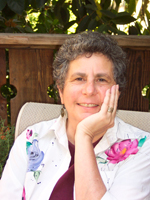
Reading the Leopard
by Susan Cohen
Susan spends much of her time looking for birds in both the San Pablo Bay and the Bodega Bay watersheds of Northern California.

Its skin in early daylight
was like an illuminated manuscript,
though its eyes held us off, illegible.
One leap into the Jackalberry tree
beside our Land Rover—
then it slid along a limb above us,
where its strip of stinking meat
hung like jerky. No one moved
except to breathe. Only when it headed
down the bark, vertical as a lizard,
last night’s kill in its jaws,
did we recognize the leg and foot
of a baby elephant flopping
with each step the leopard took
back into the bush. Not right, not wrong,
just the fly-blown standard grammar
nature puts into a cat’s mouth—
the elephant’s leg, loose
and linear as the letter l.
© Susan Cohen
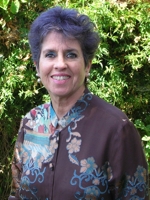
Puerto Don Juan
by Rafaella Del Bourgo
Rafaella lives between the coastal hills and the San Francisco Bay with her husband and one spoiled cat. Along the back of their property line, a row of Italian cypresses plays host to birds and squirrels. Underneath this urban neighborhood runs Potter Creek.

Silence in the cockpit of our sailboat.
Dawn bleaches Baja mountains,
pale now as our chamomile tea,
the buttered muffins on our plates.
We list to port,
stuck fast into the bay’s bottom
when the ten-foot tide swept out
as we slept.
In the deeper blue,
brown pelicans and gannets
continue diving.
All through the night,
splashing in moonshine,
they had worked for fish.
They never stopped.
A coyote, belly swollen with pups,
ventures onto wet sand,
sniffs our anchor line,
and, now just a few feet from us,
the acrid metal of outboard motor.
At the click of my camera,
she’s running fast,
up the trail – a canyon between ridges –
where hundreds of coyotes come down
to search for food along the shore,
a floundering mackerel, perhaps,
or, closer to town,
an unlucky cat, a small dog.
We hide from the blistering sun,
read, doze, wait for late afternoon
when the tide’s return will lift us
and we can sail away.
Last year one local told us
she fell asleep in the shade of her palapa,
woke to find a large male coyote
nuzzling her toes.
When asked how these animals get fresh water,
she said they lick morning cacti,
survive on dew collected from
between the spines.
© Rafaella Del Bourgo
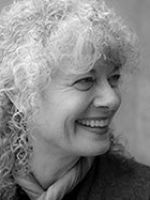
What the Stream Knows
by J.I. Kleinberg
J.I. lives in the Strait of Georgia watershed, between Squalicum Creek and Whatcom Creek, in a region dominated by majestic and, for the moment, quietly volcanic Mount Baker.

The water gathers
down from the pines
crosses the road
in a thin rippled sheet
finds a throat between houses
and washes in rivulets
over pine needles
toward the lake.
I try to repair it there
to encourage a single stream
lift and place one rock
then another
watch the slow liquid cut
through duff and dirt
and when the water insists
on diversion ignores
my intrusive engineering
I turn away stone-fisted
abandon the stream
walk toward the road
where I glance back
see at once
what the stream knows:
soft declivity between trees
pocket of gravel
and far below
where the lake licks
a large boulder
a spray of sand
left by the stream:
it has been here before.
Hands in its icy flow
I remove one rock then another
and let it lead me to the shore.
© J.I. Kleinberg
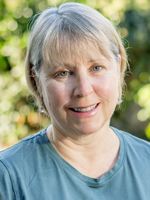
Return to Sender
by Marna Owen
Marna lives in the San Francisco Bay Delta watershed. The newest addition to her wild garden is butterfly milkweed, a showy flower that provides habitat for monarch butterflies and caterpillars. Environmental groups estimate that the Western Monarch population overwintering in California has dropped 86% from 2018 to 2019.

Dear Monarchs,
I cannot accept your farewell letter.
I beg you, let’s begin again.
I’ve planted milkweed for you.
Your favorite, just how you like it,
Sweet and wild.
I won’t take no for an answer.
So get ready for a shower of pink confetti
When I welcome you home.
© Marna Owen

Sea Lion
by John Schneider
John lives in the Wildcat Creek watershed near Tilden Park in Berkeley, California.

The seagulls hover, patient attendants, waiting
with a mid-wife’s interest.
Others perched at the edge of the hedgerow
inch foot-to-foot, by-standers
revealing nothing of their intent,
as the surf’s momentum curls into waves
drum rolls to the main event.
The surf continues its
opening and closing
beckoning and sending away
while she lies broadside to the surf
washing over and around her
rolling her this way and that.
Her sand-spackled fur glowing in the sun
she utters occasional guttural coughs.
With scant warning, blood seeps
traces of red ink
and in minutes the squirming pup
is born, the mother nudging it to swim with her
in a blood tainted sea.
The gulls swoop in and feast on what remains.
© John Schneider
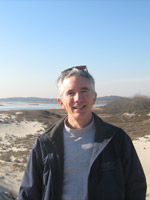
Close Encounter in the Wild
by Daniel Hudon
Daniel lives on the East Coast, not far from various nesting sites of the endangered piping plover in the Charles watershed.

Last spring, one of the doors of the universe opened for me. I was at a place where such things could happen – at a poetry conference at a camp in the woods near the coast of Maine – but it still caught me by surprise, the way a shooting star lights up ever so briefly yet lingers in your mind long afterwards. I was merely looking for solitude in the dawn light. Tree shadows on the water slowly receded as the sun rose. A soft breeze blew. I paddled my kayak to the far shore of the lake, found a small cove and there they were: a pair of loons.
All week I heard them wailing in the night, haunting all of us as one called for its mate. Like a wolf’s howl, the wail is one of the loon’s distinctive calls, a reminder of how wild the wild can be. A long mournful note that often caused me to stop whatever I was doing and pay attention. Some evenings I heard the tremolo – the “crazy laugh” – shrill enough to send a chill down my spine, as a loon signaled alarm, or the yodel, a male’s long rising call with repeating notes to defend territory, shrill enough to warn nearby males. Listen, they seemed to say, we are here. As if we were guests and needed to be reminded. Though I have heard the calls before, I have only known them from afar – never so immediate.
Soon after I slipped my kayak into the water I saw a loon in the distance and started to follow it. I wanted to get closer, just to have a better look. But it is nearly impossible to follow a loon. It catches on quickly that you are there and the game is on. It dives under the water, ostensibly to hunt for fish, but with an eye to losing you, and you wait so long to see it resurface that you doubt it was ever there in the first place. Round one to the loon. Same for rounds two and three if you have the patience to keep playing. I gave up after round three and instead sought some interesting shoreline to view.
I was already most of the way across the lake, so I kept paddling, towards a cove. Perhaps I would see a heron stepping through the shallows? Or even a moose looking for a drink of water. I glided in and there they were: the loon and its mate, swimming, only twenty feet away. They let me come close as if they were King and Queen of Loons and I was granted an audience. As they swam about I heard them cooing to one another in the kind of affection I long for, perhaps planning to build a nest. It was the right time of year.
What did I ever want in my life? What could I want?
I took my paddle out of the water and let the waves nudge me. When I drifted too close, I back-paddled; I did not want to interrupt anything. They were not far apart, only a few feet, and communicated with such tenderness that I wondered if I was seeing something no one had seen before, as if Nature herself were revealing one of her intimate secrets. Loons will “hoot” to check in with family members, but this was quieter, a private conversation whispered back and forth between lovers who had long loved each other. Despite my presence, they kept up their dialogue for some minutes, and I listened intently to this language of fondness.
Such moments never last, but I stayed as long as they would have me. If I could have torn myself away sooner, I would have. Then, the audience I was granted ended. They dove under the surface and disappeared, and I was left alone in the cove. Which- ever door that had opened so suddenly now closed again just as quickly, but not before leaving me in the glow of the light that shone through.
© Daniel Hudon
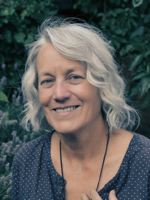
Clearing the Sparrow's House
by Kim Schnuelle
Kim splits her time between a small urban bungalow above a branch of the Salish Sea and a high desert converted storage container overlooking the Columbia River. She is unabashedly in love with the great Northwest rain forests and their inhabitants.

I am outside, fast-rubbing my gloved hands together, on a slate-sky early November morning. My husband and I are stomping boots and shivering as the northern wind rips down valley, whipping up tumbleweeds and pine needles past our legs. We are here in Eastern Washington this weekend for work - to shut down the dry cabin for the winter. Our only child, who loves this land like family, left for college two months ago and this is our first season winterizing without him. If he were here, he would be looking for coyote tracks in the frosted road and scanning the horizon for hawk sign. I can feel the ache of his absence as I rise and ready for the duties at hand.
There are so many tasks to do before dusk. This part of the state freezes over sudden and hard. Any stored water must be drained, or it will burst the containers and leak, soaking the floors at first thaw. My husband tips and gushes the liquid down the hill. What was so precious in the shade-less July heat is now just an excess burden to be fed up to sage and dead grasses. I lace up my boots more tightly and head across the field for a different but just as important task – clearing out bird box nests so new families can make a home next spring.
The cabin is both remote and connected to everything. On a hill above Brewster, Washington there’s a nice unobstructed view of the Columbia River over the low ridge and also four bands of internet service. But the road up is a twenty-minute, wash-boarded trek. Once the snows start in any serious way, our Honda Civic will never make it up the mountain.
Over the years we have set up fifteen bird houses here - sites for wren, bluebirds and even a barred owl den. The boxes are posted haphazardly over the forty-five acres. My boots crush the dead grasses, sienna brown and dry as a desiccated cricket husk, as start my task. The first house, a cheap mail order pine box, had no nest at all. The second one, tan and yellow with spiky nail perches, is full of dry twigs, old bits of down, and sleepy wasps. I flush it out and move on. The third box, rough blue-trimmed wood set high on the back-fence line, is harder to open so I pull out a wrench to twist the side screw. When it finally releases, I’m faced with a nest of dead chicks.
This land is intertwined with death. A lover it cannot seem to, or perhaps never wants to, leave. We came to this place through death as well. My mother, her body increasingly shorn away by Parkinson’s disease, finally passed on one hot July afternoon. Her ashes were scattered in a fast running Oregon river a few months later. As her only child, I inherited her estate and a piece of the same eventually changed hands in a Chelan County real estate office the following December.
Our new land held a small hunter’s cabin. Dry and without electricity, we hooked up a propane generator at night for reading. The walls were decades old pine, dry splintered from exposure to the calescent summers of Eastern Washington. Yellow jacket carcasses lay thorax up, suffocated in the gaps between window and wall. Cook stove burns branded the cheap linoleum flooring. We fell in love with the possibilities.
Eight months after the sale papers were signed and recorded, my husband and I were changing planes in Houston when, killing time, I scrolled through home state news on my phone. A large fire had broken out in the Methow Valley. This conflagration, the Carleton Complex Fire, was one of dozens that plagued Washington that summer. Eventually it would prove to be the largest in State history but at the time it was just one of so very many crossing the land. Gamboling mightily over the dry hills and valleys, it jumped roads and devoured orchards, homesteads, and unwary livestock. As I read nervously from the airport, the fire was perched to the south, near Pateros, and climbing fast up canyon. We boarded our plane. By the time we landed in Seattle, our cabin was already a ghost, vaporized and in ashes.
Once the road barricades were removed and it was safe to travel, my husband and I went out to survey the damage. Our down road neighbor’s home was smoke filled but it survived. Her corral, where legend has it a horse thief was strung up in the late 19th century, did not fare as well.
The land was a charnel ground. A blackened mouse skull lay near some ancient curled barbed wire. Our aluminum ladder was now a melted mercuric sculpture in the ashes. We grieved twice, once for the lost cabin and once again for my lost mother that made our connection to this land possible. Then we turned around, headed up the hill, and drove back to the city.
One can accept death yet still cling to life. One can refuse to succumb to finality before its time. Some months later, my husband stumbled across a tiny house inspired project, one that reconfigured old storage containers as minimalist dwellings, and our new cabin was born.
Now, a few years later, it is as if this were the only cabin that has ever stood on the rise. It’s funny how memory is that way. How we wipe our tears on our sleeves, adapt to what is in front of us, and move on.
I slid my hands under the nest and pulled it out, dead chicks and all, into the waning November light. Gingerly, I laid it down near a clump of dusky sage. In this windy hollow, I knew the nest would be blown to the horizon by morning. And so it was. We left early the next day, snow flurries braiding through the weak morning light.
Winter passed as it often does, full of fast-moving holiday celebrations and looming work deadlines. We went to and from our day jobs in total darkness. Memories of our cabin moved back into the crevices of my waking thoughts as I once again pondered buying full spectrum lights for our city home. Yet, one sun-hazy day the following March, we were back on the land again. The snows had melted, and arrow leaf balsam root were abloom over the hillsides. A large flock of California quail scurried across the ungraded road and then took flight, started by my sudden appearance on the scene. As I lugged fifty-gallon water containers into our shed, a whole season’s supply of hydration, I glanced up at the blue trim bird house. I was just in time to see a green tree swallow duck inside, a new family started on the land. I realized that I hadn’t been this happy in a very long time. I adjusted my boots and picked up another load for storage. There was still much work to be done before nightfall.
© Kim Schnuelle
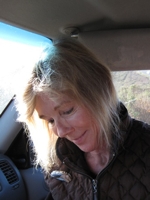
Vanishing
The grief and sense of loss we often interpret as a failure in our personality is actually a feeling of emptiness where a beautiful and strange otherness should have been encountered.
– Paul Shepard
by Elizabeth Herron
Elizabeth lives in the Atascadero Creek watershed, twin to the Laguna Watershed, both tributaries to the Russian River in Sonoma County, California, where salmon spawn and where coyotes and black-tailed deer are among her closest neighbors.

Heart, lungs and gut gone to the gnaw
of insects, the intact hull of her
beached on duff, prickly
oak and pine needles, coyote scat
in the crook of her knee --
the dog sniffs a small sharp hoof
ignoring the heap of dung
red with madrone berries,
pale pits pearling through.
She noses the foreleg
where scraps of hide cling to bone.
Imagine the first flick of tail,
ripple of skin under summer flies,
and how this fawn died.
The woods are full of stories
in rotting trunks, cool shadows
and bones like these, whitened
by winters she hadn’t seen.
But what of her stays with me?
Days later in my lumpy green chair
by the window, cat curved
around my feet on the ottoman,
the dog denned under the table,
teacup on the sill, and I think
of the fox -- its narrow bloated body
on the road, a plastic bag
snagged on its foot, ballooning
beside blood slicked fur.
Will the silence of their absence rise
above the din of cities? Will their ghosts
stumble through strip malls and suburbs
looking for lost meadows, jostle
at the on-ramps, distracting drivers
with a sudden vague unease?
Will our grief surprise us?
Will we wonder at our loneliness?
© Elizabeth Herron
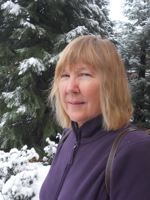
Coming Back
by Nancy Takacs
Nancy lives in the northern Mesic forest in the Lake Superior watershed of northwestern Wisconsin, catching glimpses of animals who wander from the woods to her native garden.

Take the roots like old flannel,
gray tea roses,
a broken honeycomb
back near the barn,
where hydrangea, still blue,
sleeps on a beam
in a necklace of peppermint.
Touch the flowers, the leaves,
rustle and crumble them,
smell tea, smell
last summer.
Let the winter butter
of your right palm
grasp the shovel’s
bitter handle,
and guide with your left
under the apple tree,
in quarter-blossom.
Lift earth, its many worms,
turn the plot where mother-of-
thyme is somehow
never gone.
Come back to where
all the bees you wanted to hold
last fall, are moving shadows
at your elbows, little humming
nights bound with gold.
Previously published in Clover
© Nancy Takacs
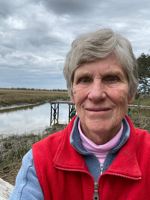
Blue Bird
by Louise Gwathmey Weld
Louise lives on the coast of South Carolina on a tidal creek in the Charleston Harbor Watershed.

Green fuzz tickles the sleeping birch.
Violets press through grass, clover and mint,
cense the yard with spring.
Small feathery architect, exuberant,
lands on blue plastic covering the mower
to extract a thread of sky for his nest.
But now, dangles from this dream-stopping
gallows, wings a stiff tangle. rusted breast,
tight-beaked with the unyielded string;
ruffle of unintended, unwilling, unable
twisted neck
in this noose he would not
and then could not relinquish.
I am joined to this suspended daze,
lashed to the stillness of wings.
© Louise Gwathmey Weld
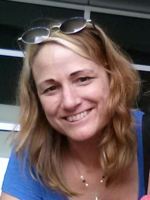
Consequences
by Donna J. Long
Donna grew up a few miles from the world's most beautiful beaches on the Gulf Coast of Florida but rode horses in orange groves instead. She now lives surrounded by spruce and beech in north central West Virginia

Ruby-throated
hummingbirds are dying
on interstate highways, drawn in
migration to wildflowers
blooming across the median, along
the shoulder. Red-winged blackbird,
fairy wren, purple finch
all at risk—who could foresee
such consequence? What if
the heart that stops, the body
to be broken is almost invisible?
What counts as unforgivable?
Tomorrow and summer will swelter
like a snare, the slow slide of sweat a rhythm
broken only by occasional violence—
thunderstorm, lightning strike, the manic front
moving east. Down south, spring’s time passes
in the crease between hard freeze
and mosquito bite. On the river swallows fall
sharp-winged from the bridge, fling
across water into sky. Who knows
where home begins? If birds return
by such subtle maps as current and breeze,
sun and star, what maps memory?
If I knew no desire
beyond what the wind brings,
if memory were brief as a bird’s life,
there would be no words
I cannot say. The chickadee could crack
a black hull for the seed inside without
breaking the sunflower’s promise.
© Donna J. Long
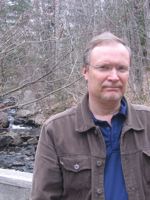
Poem on Good Friday
by Daniel Boland
Daniel lives in the Ottawa River Watershed. The Ottawa River is the second largest river in eastern Canada and is mostly located within the Canadian Shield.

An awakening, groggy earth
nurses its ice-wine hangover.
Its heart begins to speak in rivers and streams.
Craters and potholes have widened;
bleached, resurrected scraps of paper
fly like liberated avatars in the wind.
It’s no wonder the Celts fell in love
with the Christian story
with all its rocks and thorns.
In the tawny grass
a few impossibly yellow and lilac crocuses
are splashing like sacred animation.
Raking must be done.
Taxes must be paid.
The tomb must be found
empty
so the swollen rivers can flow
and the robin can nest in the eaves.
© Daniel Boland
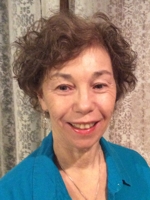
Accidental Garden
Cortes Island, BC, Canada
by Diane Ray
Diane is a native New Yorker living amidst pine and birch on a hill overlooking Green Lake in Seattle, the 50,000-year-old glacial lake fed by rain, storm run-off, and the Ceder and Tolt River Watersheds.

Walking
the scallop
of a loamy bay
I spy
a blackened
giant
portly
and casual
in death
lolling about
like a logging
whale
barnacled
by
moss
then startle
at
the mini-
garden
--wild greens
and buttercup
off-handedly
planted by
wing and wind
the grains of their
chances having
touched down
in the dead
cedar’s
belly
a kitchen
of furry
cambrium
four feet
off
earth
where
one wee
woods
does as
forests
do
hosting
orphan
and immigrant
no
questions
asked.
© Diane Ray
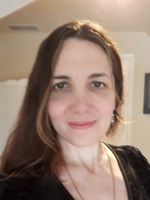
Waiting
by Federica Santini
Federica lives close to the tangled wisteria of the U.S. South. When the days get long, you can find her walking on the woodsy trails of the Tuscan archipelago and looking down at the tiny Island of the Mice from the cliffs.

Underground the weather
holds few variations, thin draughts
that we drink up with passion.
This obscurity helps us renew,
seeds forgotten at dusk
on the hillside of yearning.
Deep down, we spread out our
fingers, we grow hands as tense
as tendrils stretched out
in no known direction but
the unbending will to return.
Our velvety arms are branches
opening wide in the dark,
the purple silk of our eyelids
is beginning to glow.
Sown, we wait.
© Federica Santini